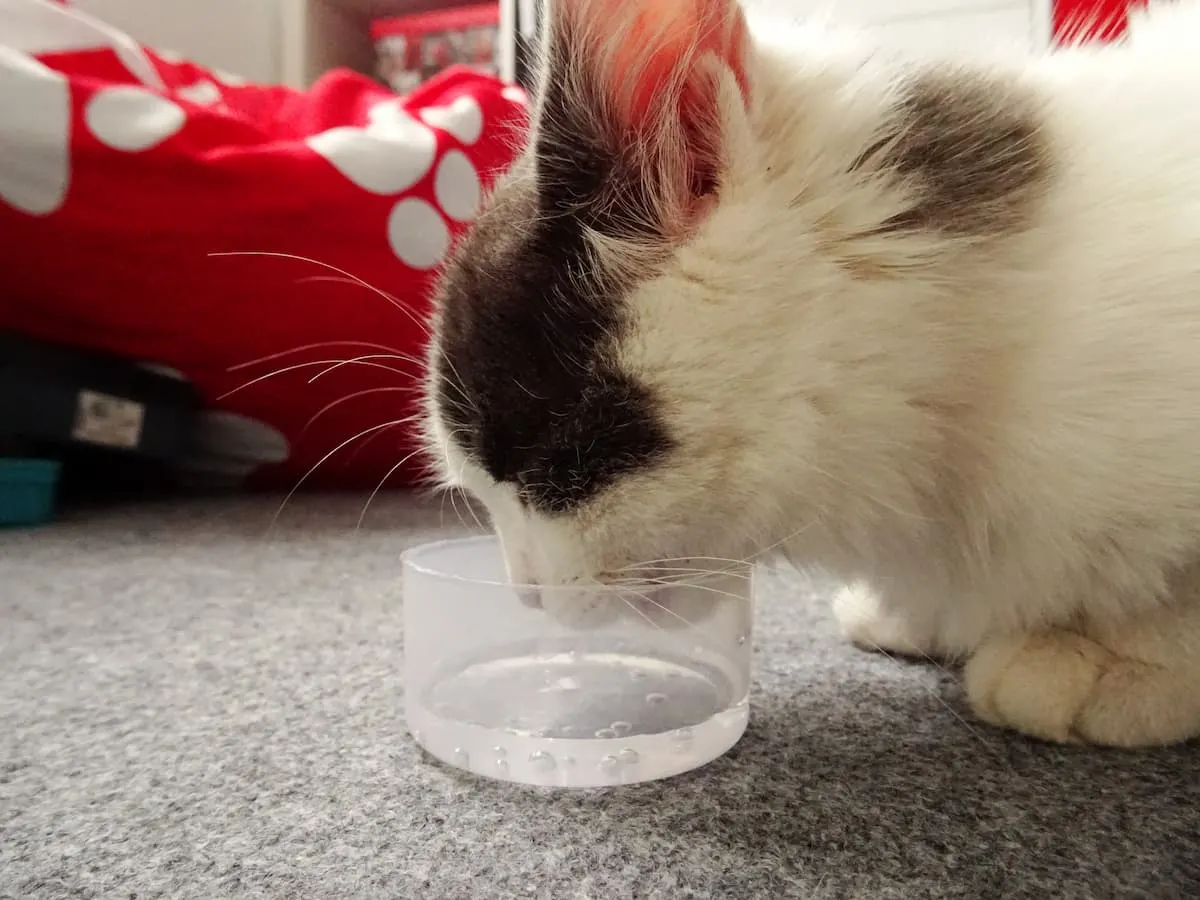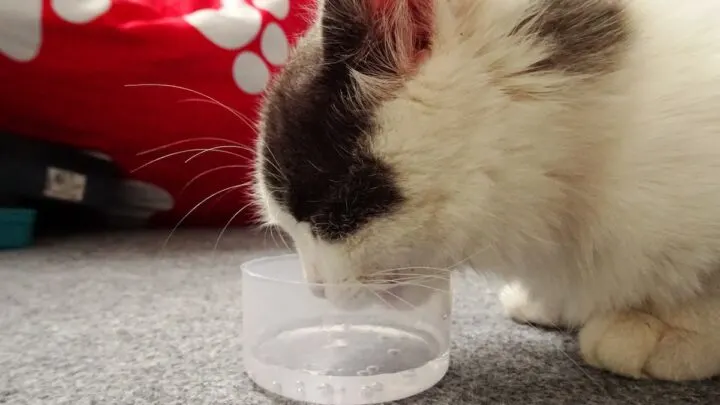Water is an essential source of hydration for adult cats. However, when it comes to kittens it can be confusing to know whether they need some sort of special drink such as a protein rich milk, or other source of hydration. This leaves many pet owners wondering, do kittens drink water?
Yes, kittens drink water. Water is essential for kittens’ overall health and wellbeing, almost immediately. However, kittens can live off of milk for the first few weeks of their life. Once your kitten has switched from cat’s milk to wet food, kibble, or a combination of the three, it’s a good time to introduce water to their diet.
Here’s what you need to know about your kitten and water.

Is It Safe For Kittens To Drink Water
Unless you’re a cat breeder or take care of an accidental litter of kittens, chances are your kittens are weaned by the time you get them. That means that they are either entirely on solid cat food (kibble and wet foods) or a combination of solid cat food and formula.
Once your cat is on solid food, they also need water in their diets to make sure they are properly hydrated. Even if your kitten is mostly drinking formula for the moment, it’s a good idea to introduce water to your kitten.
So, since your kitten needs water to stay hydrated, it’s very much safe for them to drink.
Now, that being said, kittens have a lot of the same health concerns that people do. Kittens are also young animals, and like human children, kittens can be a little more vulnerable to contaminated food and water than adult cats.
That means that if you buy distilled water or filter water from the tap for you to drink, your kitten should get the same water. That way, you can help avoid germs, bacteria, chemical contaminants, or pipe contaminants getting into your kitten’s diet.
But any water you would be comfortable drinking is probably also safe for your kitten.
When Should You Give Kittens Water
Deciding when to start giving your kitten water can be complicated if you’re raising them from birth. Thankfully, if you’re legally adopting a kitten that’s already been weaned, that decision was already made. Weaned kittens need both solid foods and water, even if you choose to also supplement with formula.
But younger kittens might need a little more care when water is presented to them. Ultimately, a little extra water in your kitten’s diet shouldn’t cause any problems if you aren’t using water as a substitute for food, i.e., cat’s milk or formula.
That being said, introducing water to your kittens a little too young can be dangerous because kittens have a habit of falling asleep in food dishes and other random locations. So leaving water out for your kittens when they are too young can be a drowning risk.
So instead of giving kittens access to water right away, monitor your kitten’s growth and watch for signs that they are ready to wean. Presenting your kittens with solid food as an option before entirely weaning them is one common technique for weaning. Giving your kittens monitored access to water at the same time is also a good idea.
You can start giving your kittens unmonitored access to water once they aren’t falling asleep quite so much and start showing signs of adult coordination. That can happen surprisingly young for some kittens, so you may also need to present certain members of a litter with access to water before the rest of the litter.
Usually, suppose you need to give your kittens water at different stages of their development. In that case, you can do that by putting water where your more coordinated kittens can reach it, but the less coordinated ones can’t.
How Many mL Of Water Should A Kitten Drink Per Day
Every cat’s needs are different, and this applies to kittens as well. Dietary recommendations for your cats are just that, recommendations. So, don’t take this as a hard and fast rule. Some kittens need more or less water than this, and some will need more encouragement to meet their hydration needs.
On average, though, kittens need about the same amount of water as adult cats per kilogram of bodyweight. That’s about 50-60 mL of water per kilogram, at least by more generous recommendations.
Other experts recommend that cats need between 60-80 mL of water in addition to their food. Those two amounts aren’t similar, which can make it hard to tell how much water your kittens need.
The difference is partly because of differences in cat’s diets and whether or not the information is based on how much water cats need vs. how much water they drink. Two things here, kittens and cats that eat kibble need more water than cats and kittens that eat wet food because the kibble doesn’t have much water content, and they need to get that water somewhere.
The other reason for different estimates is that cats can struggle to stay hydrated enough because they don’t drink very much in the wild. That’s because eating meat, their primary food source, they get a lot of their hydration from their food. So many cats drink less water than they need, making it harder to get a reasonable estimate on their water needs.
In general, it’s a good idea to make sure your kitten has free access to plenty of clean water sources. Not many cat owners measure how much water their cats are getting, so it’s alright if you can’t be precise. As long as your kitten has free access to water at all times, they should be alright.
Is It Normal For Kittens Not To Drink Water
It’s pretty standard for kittens not to want to drink water, but that doesn’t mean it’s alright if your kitten isn’t drinking.
There are a few reasons kittens might not drink water. For one thing, since cats don’t have a strong sense of thirst, water may not be that appealing to your cat. Kittens and cats also have an instinct not to drink water that’s too close to their food source since water close to their natural food is likely to be contaminated.
Kittens might also avoid drinking if they are stressed or worried or getting used to a new location. That’s alright in the short term, but it’s essential to make sure they start drinking again as soon as possible.
How Do I Get My Kitten To Drink Water
Getting your kitten to drink water can be a challenge, but once you figure out something that works, you should be able to keep your kitten well hydrated as they grow into an adult cat.
One trick to help keep your kitten hydrated is to give them hydration treats and wet food that’s tagged as hydrating since it contains a lot more water than their regular food.
Aside from that, one way to keep your kitten hydrated is to make water more appealing. Add a little low-sodium tuna water and chicken broth (not stock or any broth containing seasoning, onions, or garlic) to provide flavor.
It would help if you also considered moving your kitten’s water source further from their food or providing several different water sources. Relocating the water and making more sources available will help convince your cat to drink.
Things To Consider
Unfortunately, many cat owners who are worried about their kitten’s hydration try to solve the issue by giving their kitten cow’s milk. This isn’t a good option for several reasons.
For one thing, your kitten is likely starting to lose their lactose tolerance when you adopt them if they aren’t already lactose intolerant. So, your cat is likely to have an adverse reaction to drinking cow’s milk and may become more dehydrated as a result.
Even if your kitten doesn’t have an adverse reaction to the cow’s milk, it’s not a hydrating drink for them; it’s liquid food. Worse, that liquid food contains far too many calories and the wrong balance of nutrients for your cat.
So, while milk might get your kitten drinking, it’s not a solution for dehydration.
If you’re worried about your cat’s hydration and want to give them an emergency boost, consider getting some kitten formula. Kitten formula contains a good balance of nutrients and water for your kitten. A weak formula may help boost their hydration without reducing their appetite or stopping them from eating their solid food.
Call your vet if your kitten is showing signs of unusual lethargy or acting like something is wrong. Dehydration can be severe in kittens, and your vet will recommend options for you. In severe cases, they may recommend you take your kitten to a hospital to see if they need help getting hydrated and check and ensure nothing else is wrong.

My name is James, and welcome to FAQCats!
Along with our team of cat owners, expert pet enthusiasts, and pet professionals, we aim to write engaging helpful, engaging content about cats. At FAQCats we strive to provide content that’s accurate and fun to read. Our team writes about everything related to cats; even the most complex of topics. Through extensive research and caring for our own fur-pals, we’re able to provide something cat owners worldwide will love. Have a look around, and leave us feedback anytime!

